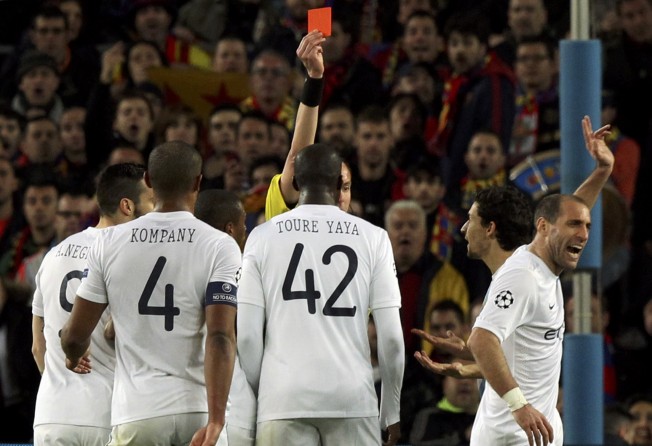When two wrongs don't make a right
Match officials, like everyone else, are human and mistakes happen. As such, they can only strive to minimise the errors

Do two wrongs make a right? The time-old question has given many match officials sleepless nights. When a referee makes an obvious error, should he make amends by doing likewise to the other team? Is this the consistency everyone apparently craves?
There are some people who believe "yes". As in the case where French referee Stephane Lannoy failed to award two blatant penalties - one to Lionel Messi and one to Edin Dzeko - during the Champions League second-leg match between Barcelona and Manchester City.
Lannoy had a clear view of the fouls. Since he did not award a penalty to Barcelona, was it fair he later denied a spot kick to Manchester City? Consistent, but consistently poor.
This is reminiscent of Howard Webb in the EPL this season, where it appears he has consciously decided not to award penalties in a bid to avoid controversy. The popular belief is that referees are remembered for what they give, as opposed to what they do not give.
There might be something in this since Webb is England's top referee and has been selected for the World Cup finals in Brazil this summer.
Very few people remember the non-calls, but those who do largely support the losing team.
In contrast, what remains etched in memories and statistical records is the red card that Lannoy gave to Manchester City's Pablo Zabaleta in the aftermath. Zabaleta was earlier cautioned for a foul, and when the Argentine took exception to Lannoy ignoring Manchester City's "nailed-on" penalty", he received his second yellow for dissent and therefore was sent off.
Other observers do not believe two wrongs make a right. And they would be correct because soccer is not analogous to mathematics where even multiples of negatives produce a positive outcome.
Why compound one error with further errors? Match officials, like everyone else, are human and mistakes happen. As such, they can only strive to minimise the number of mistakes. Unfortunately, this can lead to the perception of inconsistency and means losers will complain.
Barcelona players did not complain much. This is perhaps understandable considering Barca held the upper hand from the first leg. So when Zabaleta complained in the strongest terms - since City were chasing the game - he gave Lannoy little choice but to caution him. Players know they have to accept the referee's decision, whether correct or incorrect, because the referee has the final say. To complain vehemently is useless.
They usually claim to be "only asking the referee a question", but experienced match officials know the difference between those who are querying from those who are complaining, and from those who are being offensive, insulting or abusive.
Chelsea, particularly Jose Mourinho, are typical examples of sore losers as demonstrated by their behaviour following their loss to Aston Villa last week. A popular tactic among managers is to blame match officials so as to divert attention away from the fact that they lost.
A recent incident in a HKFA Second Division match highlights this "culture of complaining". Early in the match with no score, team A's goalkeeper had the ball in his hands and wanted to kick it upfield. However, a player sneaked up behind the goalkeeper and prodded the ball from him and then a teammate scored. The referee did not see anything untoward and signalled a goal, which angered team A's players who surrounded the referee. Meanwhile, team B's players were standing around laughing.
Rational Ref was the assistant referee and saw it all. Having told the referee what occurred (i.e. the goalkeeper had been fouled), the referee disallowed the goal. This was the correct decision and at the time both teams accepted it and play resumed.
The game was evenly balanced, but team A scored in the final minutes and won. No one should be surprised that team B made an official complaint, claiming the referee had disallowed their goal, and had held up the match for about five minutes during the fracas.
The truth is managers, players and fans only want match officials to be consistent in favour of them, without regard to whether the decision is correct or not.
Most players would accept an incorrect decision that awards them a free kick and even a goal, rather than point out to the referee that he has erred. Another term for this is hypocrisy.
A final note: TV cameras showed a huge banner at Goodison Park saying: "Evertonians are born not manufactured". Diehard Everton fans from overseas, like Malaysian Richard Wee, may not agree with that.
Agree or disagree? Contact Rational Ref at [email protected]